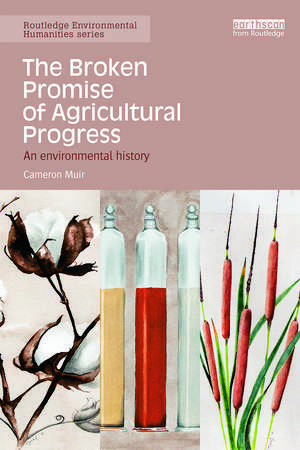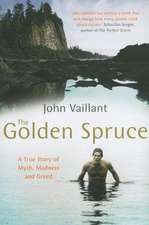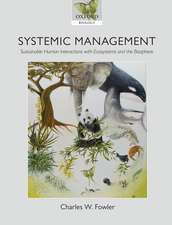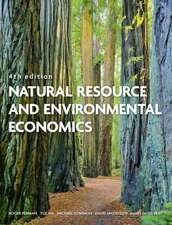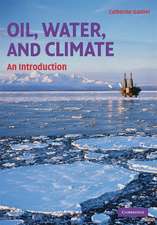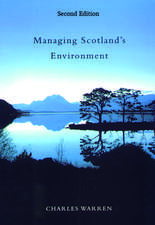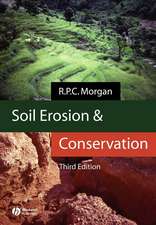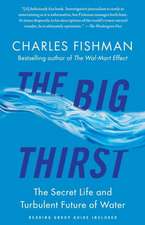The Broken Promise of Agricultural Progress: An Environmental History: Routledge Environmental Humanities
Autor Cameron Muiren Limba Engleză Paperback – 21 mai 2014
The Broken Promise of Agricultural Progress: An environmental history journeys to the dry inland plains of Australia where European ideas and agricultural technologies clashed with a volatile and taunting country that resisted attempts to subdue and transform it for the supply of global markets. Its wide-ranging narrative puts gritty local detail in its global context to tell the story of how cultural anxieties about civilisation, population, and race, shaped agriculture in the twentieth century. It ranges from isolated experiment farms to nutrition science at the League of Nations, from local landholders to high profile moral crusaders, including an Australian apricot grower who met Franklin D. Roosevelt and almost fed the world.
This book will be useful to undergraduates and postgraduates on courses examining international comparisons of nineteenth and twentieth century agriculture, and courses studying colonial development and settler societies. It will also appeal to food concerned general readers.
| Toate formatele și edițiile | Preț | Express |
|---|---|---|
| Paperback (1) | 364.39 lei 6-8 săpt. | |
| Taylor & Francis – 21 mai 2014 | 364.39 lei 6-8 săpt. | |
| Hardback (1) | 1001.07 lei 6-8 săpt. | |
| Taylor & Francis – 28 mai 2014 | 1001.07 lei 6-8 săpt. |
Din seria Routledge Environmental Humanities
-
 Preț: 295.40 lei
Preț: 295.40 lei -
 Preț: 289.51 lei
Preț: 289.51 lei -
 Preț: 302.45 lei
Preț: 302.45 lei -
 Preț: 303.87 lei
Preț: 303.87 lei -
 Preț: 294.99 lei
Preț: 294.99 lei -
 Preț: 288.41 lei
Preț: 288.41 lei -
 Preț: 386.31 lei
Preț: 386.31 lei -
 Preț: 340.64 lei
Preț: 340.64 lei -
 Preț: 281.14 lei
Preț: 281.14 lei -
 Preț: 310.51 lei
Preț: 310.51 lei -
 Preț: 280.72 lei
Preț: 280.72 lei -
 Preț: 369.99 lei
Preț: 369.99 lei -
 Preț: 288.72 lei
Preț: 288.72 lei -
 Preț: 303.87 lei
Preț: 303.87 lei -
 Preț: 326.78 lei
Preț: 326.78 lei -
 Preț: 311.41 lei
Preț: 311.41 lei -
 Preț: 288.37 lei
Preț: 288.37 lei -
 Preț: 191.93 lei
Preț: 191.93 lei -
 Preț: 347.73 lei
Preț: 347.73 lei - 18%
 Preț: 1050.78 lei
Preț: 1050.78 lei - 20%
 Preț: 1046.91 lei
Preț: 1046.91 lei - 28%
 Preț: 821.14 lei
Preț: 821.14 lei -
 Preț: 446.53 lei
Preț: 446.53 lei - 18%
 Preț: 1001.84 lei
Preț: 1001.84 lei -
 Preț: 441.74 lei
Preț: 441.74 lei - 26%
 Preț: 850.17 lei
Preț: 850.17 lei - 18%
 Preț: 1001.84 lei
Preț: 1001.84 lei -
 Preț: 369.95 lei
Preț: 369.95 lei -
 Preț: 415.24 lei
Preț: 415.24 lei - 18%
 Preț: 1001.07 lei
Preț: 1001.07 lei - 18%
 Preț: 1054.71 lei
Preț: 1054.71 lei - 18%
 Preț: 1000.87 lei
Preț: 1000.87 lei - 26%
 Preț: 819.09 lei
Preț: 819.09 lei - 18%
 Preț: 1171.19 lei
Preț: 1171.19 lei - 18%
 Preț: 1000.27 lei
Preț: 1000.27 lei - 16%
 Preț: 277.74 lei
Preț: 277.74 lei - 18%
 Preț: 1000.27 lei
Preț: 1000.27 lei -
 Preț: 403.91 lei
Preț: 403.91 lei - 15%
 Preț: 297.57 lei
Preț: 297.57 lei - 18%
 Preț: 1002.63 lei
Preț: 1002.63 lei - 18%
 Preț: 1053.16 lei
Preț: 1053.16 lei - 13%
 Preț: 297.99 lei
Preț: 297.99 lei - 18%
 Preț: 1004.20 lei
Preț: 1004.20 lei
Preț: 364.39 lei
Nou
Puncte Express: 547
Preț estimativ în valută:
69.72€ • 73.19$ • 57.87£
69.72€ • 73.19$ • 57.87£
Carte tipărită la comandă
Livrare economică 10-24 aprilie
Preluare comenzi: 021 569.72.76
Specificații
ISBN-13: 9780415731584
ISBN-10: 0415731585
Pagini: 230
Ilustrații: 44 black & white illustrations
Dimensiuni: 156 x 234 x 12 mm
Greutate: 0.33 kg
Ediția:New.
Editura: Taylor & Francis
Colecția Routledge
Seria Routledge Environmental Humanities
Locul publicării:Oxford, United Kingdom
ISBN-10: 0415731585
Pagini: 230
Ilustrații: 44 black & white illustrations
Dimensiuni: 156 x 234 x 12 mm
Greutate: 0.33 kg
Ediția:New.
Editura: Taylor & Francis
Colecția Routledge
Seria Routledge Environmental Humanities
Locul publicării:Oxford, United Kingdom
Public țintă
General and PostgraduateCuprins
Introduction Foreword by Iain McCalman and Libby Robin 1. Hooves 2. Bores 3. Scrub 4. Wheat 5. Dust 6. Reeds 7. Cotton Conclusion
Notă biografică
Cameron Muir is Australian Research Council Postdoctoral Fellow at the Australian National University and the National Museum of Australia. From 2013 to 2014, he was Fellow at the Rachel Carson Center for Environment and Society, Ludwig Maximilian University of Munich, Germany, and a visiting scholar at The University of Wisconsin-Madison’s Center for Culture, History, and Environment (CHE), part of the Nelson Institute for Environmental Studies, USA.
Recenzii
'Cameron Muir has produced a brilliant, far-reaching book that combines environmental and agricultural approaches to urgent questions about food politics and land management. This is a terrific work of historically textured, geographically immersed story-telling that also has a strong conceptual payoff in debunking resilient myths about what it would take to feed the world. Muir's conclusions will reverberate across disciplines and national borders.'–Rob Nixon, University of Wisconsin, USA
'In his gripping account of the failures of European agriculture on the western plains of New South Wales, Cameron Muir challenges our assumptions about the social and environmental outcomes of agricultural progress. How can global food security be maintained, given that modern farming technologies can ‘break’ places? Muir’s perceptive and fresh analysis alerts us to why the lessons of the past are so crucial for the future management of our environments.' –Kate Darian-Smith, University of Melbourne, Australia
'This book is remarkable in the way it builds – from an incredibly wide range of sources – an ecological history of what the unbridled quest for agricultural rewards may do to poorly understood lands, especially drylands. In all, this is an enthralling and very important book that deserves to be read by a wide audience of agriculturalists, sociologists, farmers, conservationists and ecologists among others.' –P.S. Lake, Monash University, Australia
'In his gripping account of the failures of European agriculture on the western plains of New South Wales, Cameron Muir challenges our assumptions about the social and environmental outcomes of agricultural progress. How can global food security be maintained, given that modern farming technologies can ‘break’ places? Muir’s perceptive and fresh analysis alerts us to why the lessons of the past are so crucial for the future management of our environments.' –Kate Darian-Smith, University of Melbourne, Australia
'This book is remarkable in the way it builds – from an incredibly wide range of sources – an ecological history of what the unbridled quest for agricultural rewards may do to poorly understood lands, especially drylands. In all, this is an enthralling and very important book that deserves to be read by a wide audience of agriculturalists, sociologists, farmers, conservationists and ecologists among others.' –P.S. Lake, Monash University, Australia
Descriere
Food and the global agricultural system has become one of the defining public concerns of the twenty-first century. This book examines the ecological disorder and inequity at the heart of our food system. It tells the story of how the development of modern agriculture promised ecological and social stability but instead descended into dysfunction. Contributing to knowledge in environmental, cultural and agricultural histories, it explores how people have tried to live in the aftermath of ‘ecological imperialism’.
